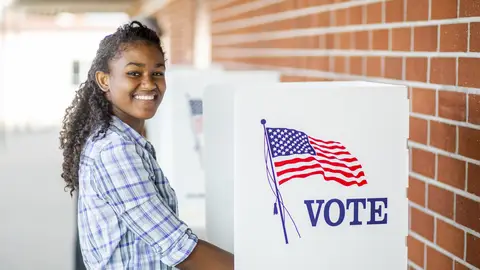Here's Everything You Need to Know to Vote in the 2018 Midterm Elections

The 2018 midterm elections are looming on the horizon—and now more than ever, your vote matters. A record number of openly LGBTQ people are running for office locally and federally. Plus, this year's elections could turn the House of Representatives back over to the Democrats—and out of the tight grasp of the GOP, whose track record regarding LGBTQ acceptance, inclusion, and protections leaves much to be desired.
Below, find a guide to voting in the U.S., including helpful online resources you can use to cast your ballot with confidence on November 6.
Know your state's unique voting regulations
Save for North Dakota, every state in the U.S. requires of-age residents to register to vote. Consult USA.gov to learn more about your state's unique voting regulations, including eligibility guidelines and registration deadlines. Some states, like Vermont, New Hampshire, and California, permit same-day, in-person voter registration. Other states, including New York, California, and Illinois, allow residents to register to vote or alter their voter profile completely online. (Note that the deadline to register or alter your registration in time for the 2018 General Elections has already passed in many states.)
Above: Out actress, activist, and New York Democratic gubernatorial candidate Cynthia Nixon debates incumbent Gov. Andrew Cuomo.
Get informed about your candidates and local referendums...
Knowing who and what you want to support on Election Day is half the battle. There are countless free resources to use to research the candidates running for office in your area, including Ballotpedia, a comprehensive digital encyclopedia of U.S. politics and elections, and your state's Board of Elections website. If supporting queer candidates is a high priority for you, consult Victory Fund, a nonprofit that catalogs and endorses select openly LGBTQ politicians running for office around the country.
Additionally, it's worth looking up the ballot initiatives and referendums slated to appear on your local ballot before showing up at the polls. These initiatives are often worded in a confusing or complex matter, so knowing what to expect when you're filling out your ballot can help streamline the process. Visit your state or county's Board of Elections website for more information.
...and brush up on issues that matter locally and nationally
Once you've determined who's running in your area, consult the candidate's social media or official campaign website for an in-depth look at their stances on various issues. Key issues to keep in mind this election cycle will come as no surprise to avid news readers: Immigration reform, healthcare inaccessibility, sensible gun reform, and income inequality are all much-discussed topics candidates in your state, city, or town are likely to address.
Not in the U.S. on Election Day? Not a problem
Every state has an absentee voting process in place, which generally allows registered voters who are living overseas, serving in the military, or who belong to military families to cast their ballots in advance. Twenty-seven states and the District of Columbia even permit absentee voting without having to offer an excuse. However, laws do vary locally. Visit USA.gov to learn more about your state's individual absentee voting process and ballot submission deadlines.
Know your rights as a voter
Polling stations across the country are required by law to be accessible to all registered voters, including people with disabilities and language barriers. As long as you make it to the polls and are standing in line before the polls close, you are permitted to vote, so keep your place in line. Additionally, if your name is not listed in the poll book at your designated polling station, you are still entitled to cast a provisional ballot. Refer to the ACLU's voter rights guide for more information.
Don't be afraid to report misconduct at the polls
Voter intimidation or disenfranchisement are real concerns, often especially so for people who belong to marginalized communities. If you encounter intimidation or disenfranchisement at the polls, report your concerns to the Election Protection Hotline (866-OUR-VOTE); the Department of Justice Voting Rights Hotline (800-253-3931); or online at Justice.gov.
Last, but not least: Mark your calendars
You can't vote without knowing when to show up! Consult the U.S. Vote Foundation's digital database for every major deadline and date you need to know in your state or city. Depending on your state, your Primary Elections could be coming up very soon or might have already passed. (Note that some states, including New York, Pennsylvania, and Maryland, restrict voter participation in the Primary Elections to registered political party members only, so visit the National Conference of State Legislatures' website to brush up on the specific regulations in your area.)
Across the board, General Elections in the U.S. will take place on Tuesday, November 6. Visit your state's Board of Elections website to locate your polling place, and check USA.gov for day-of photo ID requirements local to you.
And don't forget to bring a friend: Check out MTV's +1thevote campaign to connect with friends who might not be registered to vote.
Click the graphic above to learn about LGBTQ candidates running for office nationwide.





